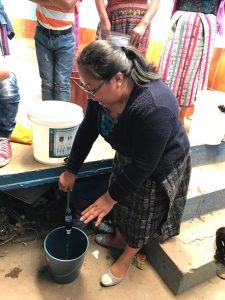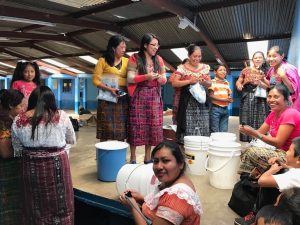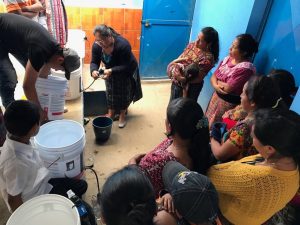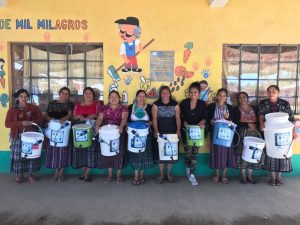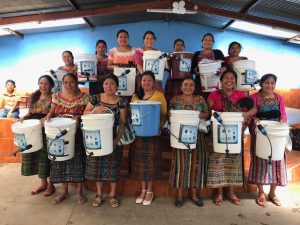This project is made possible through the partnership of WATER CHARITY and the NATIONAL PEACE CORPS ASSOCIATION. ![]()
This project has been completed. To read about the conclusion, CLICK HERE.
Location
This project takes place in Sololá, the second poorest department of Guatemala, where 94% of the families live on less than $3.00 per day. According to the Guatemalan government, 98% of the state of Sololá is indigenous Maya.
1. Paraje Nuevo Progreso, Canton Pahaj, Santa Lucía Utatlán, Sololá, Guatemala
2. Los Planes, Chuchexic, Santa Lucía Utatlán, Sololá, Guatemala
3. Canton Pahaj, Santa Lucía Utatlan, Sololá, Guatemala
4. Casco Urbano, San Juan la Laguna, Sololá, Guatemala
Problem Addressed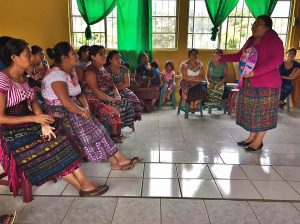
Sources estimate that 90-95% of the water in Guatemala is contaminated. While the mothers have learned that water is the best thing to give their children to drink, they don’t have a source of clean water in their homes, and water can often be more expensive than sugary drinks.
Project Description
This project is to provide 100 Sawyer water filters to families in the following communities:
1. Paraje Nuevo Progreso, Canton Pahaj, Santa Lucía Utatlan, Sololá Guatemala
a. Nuevo Progreso is a small, rural community in Santa Lucía Utatlan. The community has fought with Mil Milagros by its side to build a two-room schoolhouse, kitchen, bathrooms, and playground for the children in the community. The community has 36 school-aged children, 26 babies and young children, two teachers, and 37 mother volunteers.
b. Problem Description: Nuevo Progreso is a community with a serious water problem. MM provided the funds for the community to build a well in the school and Water Charity provided the pump in 2014. We are currently working with Rotary International on a larger, community-wide water project to provide sufficient water for 20 families and another source for the school.
c. Project: Four filters will be distributed to mother leaders in the nutrition program in Nuevo Progreso.
2. Paraje Los Planes, Canton Chuchexic, Santa Lucía Utatlán, Sololá, Guatemala
a. Chutinamit Pacaman is a rural community 20 minutes from the town center of Santa Lucía Utatlán. The school has 194 children, 10 teachers, and 20 mother leaders.
b. Problem Description: Many families in this community have limited access to running water. The rates of childhood malnutrition are nearly 80% in this community, in large part due to poor hygiene practices and drinking contaminated water.
c. Project: 20 filters will be distributed in Los Planes for the mother leaders in the nutrition and health/hygiene programs.
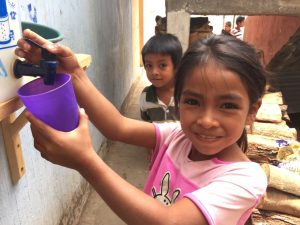 3. Canton Pahaj, Santa Lucía Utatlan, Sololá, Guatemala
3. Canton Pahaj, Santa Lucía Utatlan, Sololá, Guatemala
a. Pahaj is a larger community outside of the main town of Santa Lucía, with a large population of men who are in the United States. Many are unable to send money to their families. MM is serving Pahaj with an early childhood development program.
b. Problem Description: Pahaj has very little water and the water sources are unreliable. They have been lobbying the government to receive another water source.
c. Project: 9 water filters will be distributed to the mother leaders in the early childhood development program in Pahaj.
4. Casco Urbano, San Juan la Laguna, Sololá, Guatemala
a. San Juan la Laguna is a town of 5,800 residents situated on Lake Atitlan. They are coffee farmers who work small plots of land to feed their families and are dependent upon crop yields and at the mercy of the pricing of large intermediaries for their livelihoods. Mil Milagros works with all four public pre- and primary schools in San Juan la Laguna.
b. Problem description: The local community health center in San Juan la Laguna reports that they have 7-10 diarrhea-related illnesses in the health center each month and many more that go unreported. The health center named poor water conditions as one of the primary reasons for the intestinal infections they treat.
c. Project: 67 water filters will be distributed to the mother leaders in the four primary schools in San Juan la Laguna.
Project Impact
Over 600 people will benefit from the project.
Peace Corps Volunteer Directing Project
Carolyn Daly, RPCV, In-Country Director, Mil Milagros, a local NGO that has as its mission to partner with communities to prevent malnutrition and hunger and improve the health and education of children in Guatemala. To achieve this goal, they implement programs in eight communities serving more than 1,400 children. The early childhood development program currently serves more than 200 babies and young children and more than 150 mothers in weekly workshops on topics in nutrition, health and hygiene, child development, and early literacy.
Monitoring and Maintenance
Mil Milagros will manage the project and monitor and evaluate its success.
Funding
This project has been funded through the generosity of Michael and Carla Boyle, of Nelsonville, Ohio.
Conclusion of Solola Water Filter Project, Phase 4 – Guatemala
This project has been completed under the direction of Returned Peace Corps Volunteer Carolyn Daly. To read about the start of the project, CLICK HERE.
The project was designed to provide 100 Sawyer water filters to families in the five communities.
Carolyn reports:
Scope of the project
The Sololá Water Filter Project, Phase Four provided 100 Sawyer filters to mother leaders and their families in five Mil Milagros (MM) partner communities. The filters will benefit 600 family members.Specific work done
Filters were given to each mother leader in five partner communities to be used in their homes with their children. The communities were Los Planes Chuchexic, Santa Lucía Utatlán; Nuevo Progreso, Santa Lucía Utatlán; Xesampual, Santa Lucía Utatlán; Parracaná, Santa Lucía Utatlán; and Pahaj, Santa Lucía Utatlán.Progression of project
MM staff members trained the mother leaders in the setup and maintenance of the filters as well as expectations for continued use. After setting up one filter, the staff then supervised mother leaders in the installation of the rest of the filters and taught them how to clean the filters as well. The mother leaders then took responsibility for the maintenance and use of filters daily. MM staff visited the homes to monitor the use and proper maintenance of filters and also surveyed the mothers regarding filter use.End result of project
MM staff members surveyed mothers to find out how many of them drank purified water in their homes. b100 mothers, only 36 mothers drank water at all and only 12 drank purified water in their homes on a regular basis, and they needed to boil the water in order to purify it, resulting in a high cost to the mothers as they use stoves powered by firewood. Now, all 100 mothers are drinking purified water in their homes as are their children and families.One mother told us, “I learned from Mil Milagros that we should be drinking more water and not as much juice or sugary beverages, but I didn’t have the possibility to buy water. But now I have a filter and my children have gotten into the habit of just going to the filter and drinking water. It has made a big difference!”
We extend our thanks to Carolyn for completing this important project.
